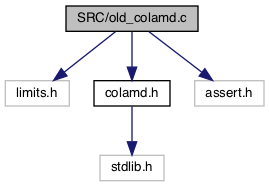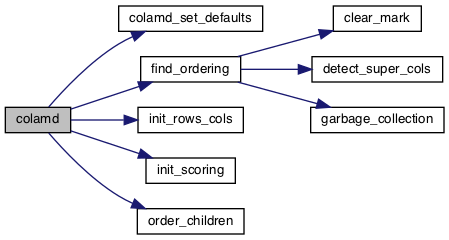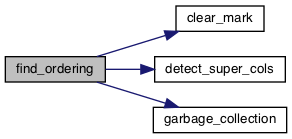An approximate minimum degree column ordering algorithm. More...
Include dependency graph for old_colamd.c:

Classes | |
| struct | ColInfo_struct |
| struct | RowInfo_struct |
Macros | |
| #define | MAX(a, b) (((a) > (b)) ? (a) : (b)) |
| #define | MIN(a, b) (((a) < (b)) ? (a) : (b)) |
| #define | ONES_COMPLEMENT(r) (-(r)-1) |
| #define | TRUE (1) |
| #define | FALSE (0) |
| #define | EMPTY (-1) |
| #define | ALIVE (0) |
| #define | DEAD (-1) |
| #define | DEAD_PRINCIPAL (-1) |
| #define | DEAD_NON_PRINCIPAL (-2) |
| #define | ROW_IS_DEAD(r) ROW_IS_MARKED_DEAD (Row[r].shared2.mark) |
| #define | ROW_IS_MARKED_DEAD(row_mark) (row_mark < ALIVE) |
| #define | ROW_IS_ALIVE(r) (Row [r].shared2.mark >= ALIVE) |
| #define | COL_IS_DEAD(c) (Col [c].start < ALIVE) |
| #define | COL_IS_ALIVE(c) (Col [c].start >= ALIVE) |
| #define | COL_IS_DEAD_PRINCIPAL(c) (Col [c].start == DEAD_PRINCIPAL) |
| #define | KILL_ROW(r) { Row [r].shared2.mark = DEAD ; } |
| #define | KILL_PRINCIPAL_COL(c) { Col [c].start = DEAD_PRINCIPAL ; } |
| #define | KILL_NON_PRINCIPAL_COL(c) { Col [c].start = DEAD_NON_PRINCIPAL ; } |
| #define | PUBLIC |
| #define | PRIVATE static |
| #define | DEBUG0(params) ; |
| #define | DEBUG1(params) ; |
| #define | DEBUG2(params) ; |
| #define | DEBUG3(params) ; |
| #define | DEBUG4(params) ; |
Typedefs | |
| typedef struct ColInfo_struct | ColInfo |
| typedef struct RowInfo_struct | RowInfo |
Functions | |
| PRIVATE int | init_rows_cols (int n_row, int n_col, RowInfo Row[], ColInfo Col[], int A[], int p[]) |
| PRIVATE void | init_scoring (int n_row, int n_col, RowInfo Row[], ColInfo Col[], int A[], int head[], double knobs[COLAMD_KNOBS], int *p_n_row2, int *p_n_col2, int *p_max_deg) |
| PRIVATE int | find_ordering (int n_row, int n_col, int Alen, RowInfo Row[], ColInfo Col[], int A[], int head[], int n_col2, int max_deg, int pfree) |
| PRIVATE void | order_children (int n_col, ColInfo Col[], int p[]) |
| PRIVATE void | detect_super_cols (ColInfo Col[], int A[], int head[], int row_start, int row_length) |
| PRIVATE int | garbage_collection (int n_row, int n_col, RowInfo Row[], ColInfo Col[], int A[], int *pfree) |
| PRIVATE int | clear_mark (int n_row, RowInfo Row[]) |
| PUBLIC int | colamd_recommended (int nnz, int n_row, int n_col) |
| PUBLIC void | colamd_set_defaults (double knobs[COLAMD_KNOBS]) |
| PUBLIC int | colamd (int n_row, int n_col, int Alen, int A[], int p[], double knobs[COLAMD_KNOBS]) |
Detailed Description
An approximate minimum degree column ordering algorithm.
Copyright (c) 2003, The Regents of the University of California, through Lawrence Berkeley National Laboratory (subject to receipt of any required approvals from U.S. Dept. of Energy)
All rights reserved.
The source code is distributed under BSD license, see the file License.txt at the top-level directory.
Macro Definition Documentation
◆ ALIVE
| #define ALIVE (0) |
◆ COL_IS_ALIVE
| #define COL_IS_ALIVE | ( | c | ) | (Col [c].start >= ALIVE) |
◆ COL_IS_DEAD
| #define COL_IS_DEAD | ( | c | ) | (Col [c].start < ALIVE) |
◆ COL_IS_DEAD_PRINCIPAL
| #define COL_IS_DEAD_PRINCIPAL | ( | c | ) | (Col [c].start == DEAD_PRINCIPAL) |
◆ DEAD
| #define DEAD (-1) |
◆ DEAD_NON_PRINCIPAL
| #define DEAD_NON_PRINCIPAL (-2) |
◆ DEAD_PRINCIPAL
| #define DEAD_PRINCIPAL (-1) |
◆ DEBUG0
| #define DEBUG0 | ( | params | ) | ; |
◆ DEBUG1
| #define DEBUG1 | ( | params | ) | ; |
◆ DEBUG2
| #define DEBUG2 | ( | params | ) | ; |
◆ DEBUG3
| #define DEBUG3 | ( | params | ) | ; |
◆ DEBUG4
| #define DEBUG4 | ( | params | ) | ; |
◆ EMPTY
| #define EMPTY (-1) |
◆ FALSE
| #define FALSE (0) |
◆ KILL_NON_PRINCIPAL_COL
| #define KILL_NON_PRINCIPAL_COL | ( | c | ) | { Col [c].start = DEAD_NON_PRINCIPAL ; } |
◆ KILL_PRINCIPAL_COL
| #define KILL_PRINCIPAL_COL | ( | c | ) | { Col [c].start = DEAD_PRINCIPAL ; } |
◆ KILL_ROW
| #define KILL_ROW | ( | r | ) | { Row [r].shared2.mark = DEAD ; } |
◆ MAX
| #define MAX | ( | a, | |
| b | |||
| ) | (((a) > (b)) ? (a) : (b)) |
◆ MIN
| #define MIN | ( | a, | |
| b | |||
| ) | (((a) < (b)) ? (a) : (b)) |
◆ ONES_COMPLEMENT
| #define ONES_COMPLEMENT | ( | r | ) | (-(r)-1) |
◆ PRIVATE
| #define PRIVATE static |
◆ PUBLIC
| #define PUBLIC |
◆ ROW_IS_ALIVE
| #define ROW_IS_ALIVE | ( | r | ) | (Row [r].shared2.mark >= ALIVE) |
◆ ROW_IS_DEAD
| #define ROW_IS_DEAD | ( | r | ) | ROW_IS_MARKED_DEAD (Row[r].shared2.mark) |
◆ ROW_IS_MARKED_DEAD
| #define ROW_IS_MARKED_DEAD | ( | row_mark | ) | (row_mark < ALIVE) |
◆ TRUE
| #define TRUE (1) |
Typedef Documentation
◆ ColInfo
| typedef struct ColInfo_struct ColInfo |
◆ RowInfo
| typedef struct RowInfo_struct RowInfo |
Function Documentation
◆ clear_mark()
◆ colamd()
| PUBLIC int colamd | ( | int | n_row, |
| int | n_col, | ||
| int | Alen, | ||
| int | A[], | ||
| int | p[], | ||
| double | knobs[COLAMD_KNOBS] | ||
| ) |
Here is the call graph for this function:

◆ colamd_recommended()
| PUBLIC int colamd_recommended | ( | int | nnz, |
| int | n_row, | ||
| int | n_col | ||
| ) |
◆ colamd_set_defaults()
| PUBLIC void colamd_set_defaults | ( | double | knobs[COLAMD_KNOBS] | ) |
◆ detect_super_cols()
| PRIVATE void detect_super_cols | ( | ColInfo | Col[], |
| int | A[], | ||
| int | head[], | ||
| int | row_start, | ||
| int | row_length | ||
| ) |
◆ find_ordering()
| PRIVATE int find_ordering | ( | int | n_row, |
| int | n_col, | ||
| int | Alen, | ||
| RowInfo | Row[], | ||
| ColInfo | Col[], | ||
| int | A[], | ||
| int | head[], | ||
| int | n_col2, | ||
| int | max_deg, | ||
| int | pfree | ||
| ) |
Here is the call graph for this function:

◆ garbage_collection()
| PRIVATE int garbage_collection | ( | int | n_row, |
| int | n_col, | ||
| RowInfo | Row[], | ||
| ColInfo | Col[], | ||
| int | A[], | ||
| int * | pfree | ||
| ) |
◆ init_rows_cols()
◆ init_scoring()
| PRIVATE void init_scoring | ( | int | n_row, |
| int | n_col, | ||
| RowInfo | Row[], | ||
| ColInfo | Col[], | ||
| int | A[], | ||
| int | head[], | ||
| double | knobs[COLAMD_KNOBS], | ||
| int * | p_n_row2, | ||
| int * | p_n_col2, | ||
| int * | p_max_deg | ||
| ) |